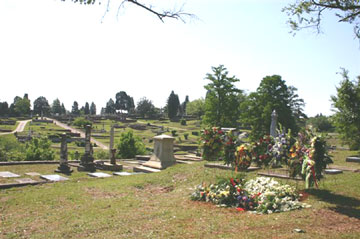|
Home
|
Phil Walden Update Walden gets recognition in death Here's a photo of Phil Walden's grave after the service. It's not on the side of Rose Hill Cemetery where Duane Allman and Berry Oakley are buried - it's more to the north, on the hill above the Johnston tomb, which The Allman Brothers Band posed before on the back cover of their first album. It's somewhat near the Martha Ellis (Little Martha) memorial. In death, the City of Macon finally gave Phil some of the recognition he was due. His life was reviewed over three days by The Macon Telegraph, and even Macon society had to pay attention to the celebrities who attended the funeral. It was finally acknowledged that Phil was a founding member of the Macon Heritage Association. In the mid-60s, when many historic Macon buildings were being torn down in various urban development projects, Phil purchased and restored old homes. Macon now bases its tourist industry on Historic Macon - a history that would live only in books if it were not for Phil Walden. Nor would the Macon Symphony exist without him. He needed quality musicians for his recording studio and got tired of bringing them from out of town. Phil, along with the Macon Federation of Musicians and the local colleges worked hard to form the symphony. The dream was to use it to develop the careers of promising musicians from middle Georgia. Unfortunately, the Macon attitude set in again - if it's not from Atlanta, it's not worth anything. The Macon Symphony is now made up almost entirely of folks imported from Atlanta. Musicians in Macon, despite their qualifications, can't get an audition. At least Phil got recognition in death. |
